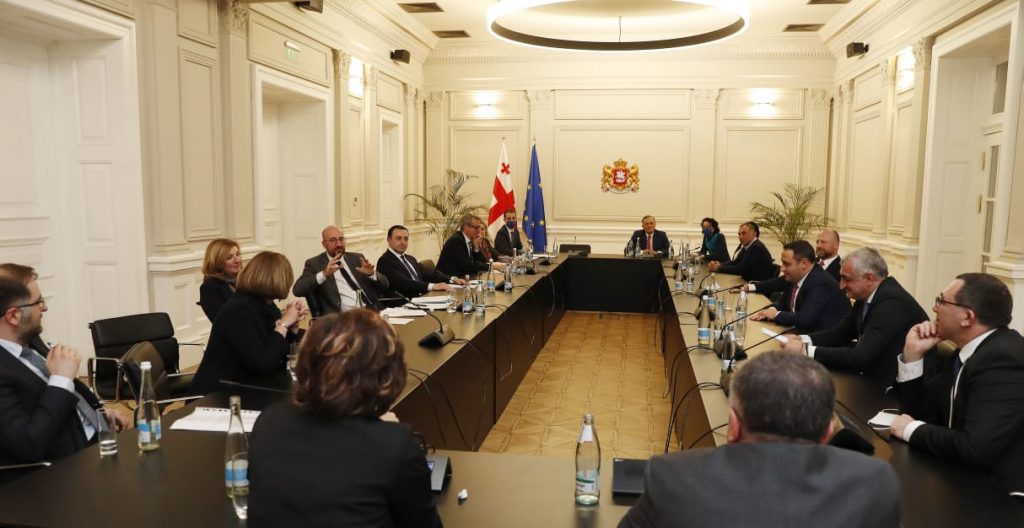“The political dialogue in Georgia is re-launched tonight,” announced European Council President Charles Michel after mediating over a two-hour-long meeting between Prime Minister Irakli Garibashvili and the opposition leaders in the Presidential Palace in Tbilisi.
“In this country, there are many difficult and complex challenges: economic development, social cohesion, COVID-19, security, stability. These are very essential challenges that need to be tackled and that is why it is urgent to solve this political crisis,” European Council President highlighted.
“Tonight, I am proud that a good step, an important step in the right direction has been taken,” the President stressed, adding however that tonight’s sought-after relaunch of dialogue, stalled since early December, “does not mean that everything is solved.”
“In two weeks we will have in Brussels the next Association Council with Georgia. It will be a rendez-vous in order to observe what progress has been made on the different difficult topics,” the top EU official asserted.
But in his words, “the main message is the following: what counts for the EU is the protection of the interests of the Georgian citizens.”
Prime Minister’s Remarks
In his media remarks in the Presidential Palace, Prime Minister Irakli Garibashvili hailed the meeting for its “constructive atmosphere” and highlighted that “we agreed that this dialogue will continue.”
Noting that he will further consult over the issues with the political council of the Georgian Dream party, the Prime Minister said: “I reiterated at the meeting, that we must find a [space for] opportunity, [find] a common national idea that will unite our people, our nation.”
“This is what our country needs the most today, a national consensus on concrete topics, not on differences, that we might [the opposition and the Government] have,” the Prime Minister asserted, adding that the sides should focus on Russian occupation, poverty, economic hardships, and COVID pandemic.
He then expressed hopes that the “opposition will continue working in a constructive regime” and on his part, underlined his “full readiness to continue the dialogue.”
Opposition Remarks
Salome Samadashvili of the United National Movement, the largest opposition party, said the relaunched of the dialogue is the main outcome of today’s meeting.
She highlighted the importance of progressing on the release of alleged political prisoners and the snap elections, “otherwise, the talks only for the sake of talks will yield no results.”
Welcoming the meeting, David Bakradze of European Georgia said the sides agreed on the framework for discussion topics. According to Bakradze, the release of alleged political prisoners, snap elections and the court reform are on the negotiation table for the parties to discuss in a bid to “normalize” the political situation.
Zurab Japaridze of the right-libertarian Girchi-More Freedom party said President Michel tabled the six negotiation points, with the two new points being the court reform and the power-sharing, without providing specific details.
Giorgi Vashadze of Strategy Aghmashenebeli hailed the meeting as “unprecedented” and welcomed the dialogue’s elevation at the European Council President’s level. Vashadze said President Michel will be personally involved in the successful completion of the talks.
Irma Inashvili of the Kremlin-friendly Alliance of Patriots said their only demand – “the only way out” of the crisis – is scheduling the new elections. Time will show what the next steps should be in this direction, Inashvili said.
Apart from the opposition leaders quoted here, UNM’s Akaki Minashvili, Republican Party’s Khatuna Samnidze, Giga Bokeria of European Georgia, Lelo’s Mamuka Khazaradze, Alexander Elisashvili of the Citizens Party, Labor’s Shalva Natelashvili and Irma Inashvili of the Alliance of Patriots were present at the meeting. President Salome Zurabishvili was not in attendance.
Earlier Developments, Background
The European Council President announced about inviting Georgian Government officials and the opposition leaders for a meeting with his mediation earlier today during the joint press conference with Prime Minister Irakli Garibashvili.
Major opposition parties have been rejecting the official results of the “rigged” October 2020 parliamentary elections. 54 of 60 opposition MPs are still boycotting the new 150-member Parliament. The post-election talks, facilitated by the U.S. and EU diplomats, have been stalled since December after now-GD Chair Irakli Kobakhidze unveiled a bill to strip boycotting parties of state funding.
In the most recent events, developed in late February, the crisis further deepened after the detention of top opposition leader Nika Melia, only a few hours after PM Garibashvili’s election as Prime Minister. PM Garibashvili replaced Giorgi Gakharia, who resigned after refusing to greenlight Melia’s detention.
UNM’s Melia, charged for inciting violence during June 2019 anti-occupation unrest outside the Parliament, refused to pay additional bail, imposed on him after throwing monitoring tag – as a sign of protest – during one of the post-election rallies in November.
This post is also available in: ქართული (Georgian) Русский (Russian)

